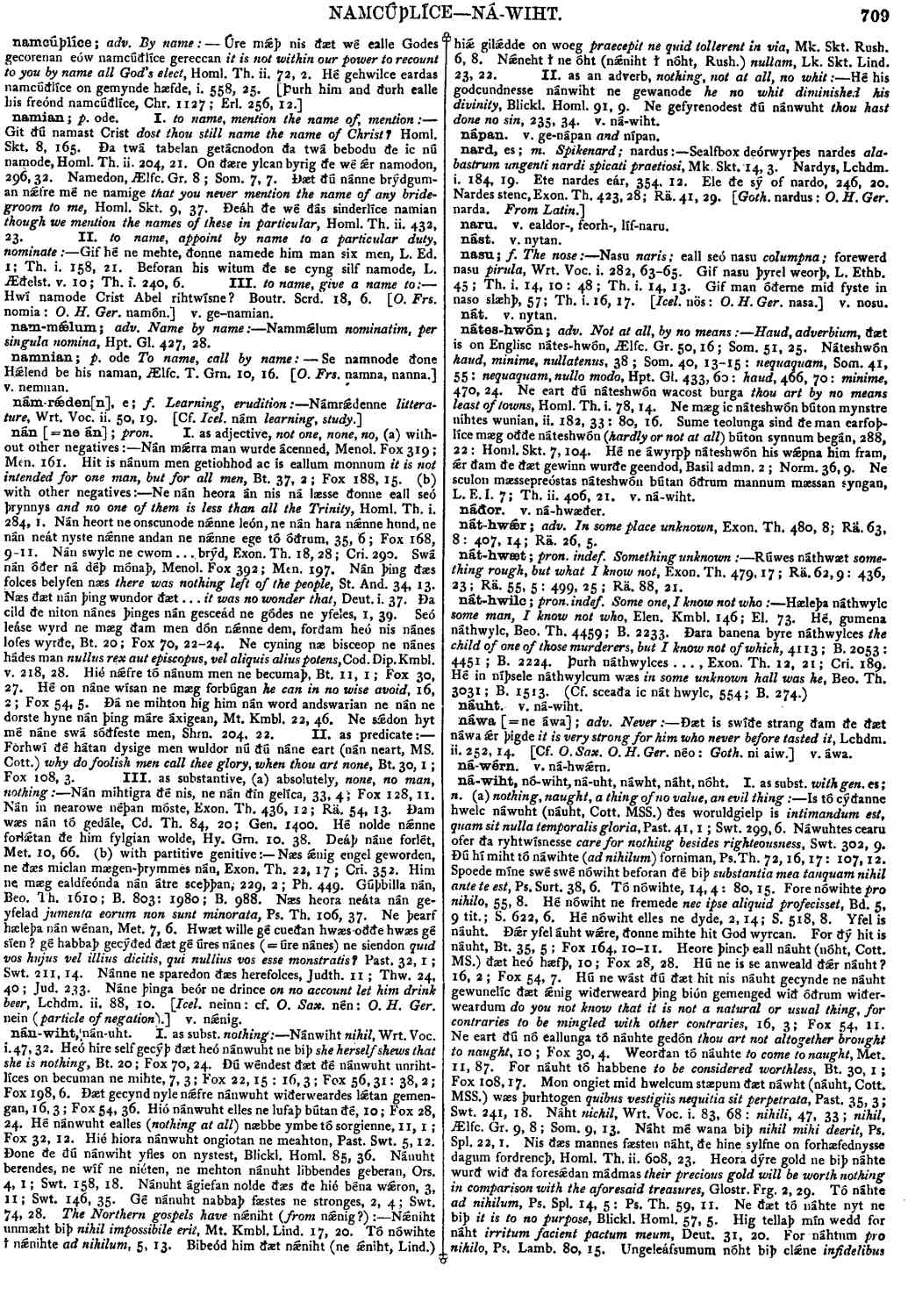nán-wiht
- noun [ neuter ]
- adverb
- pronoun
-
Nánwiht
nihil,
- Wrt. Voc. i. 47, 32.
-
Heó hire self gecýþ ðæt heó nánwuht ne biþ
she herself shews that she is nothing,
- Bt. 20 ;
- Fox 70, 24.
-
Ðú wéndest ðæt ðé nánwuht unrihtlíces on becuman ne mihte,
- 7, 3 ;
- Fox 22, 15 : 16, 3 ;
- Fox 56, 31: 38, 2 ;
- Fox 198, 6.
-
Ðæt gecynd nyle nǽfre nánwuht wiðerweardes lǽtan gemengan,
- 16, 3 ;
- Fox 54, 36.
-
Hió nánwuht elles ne lufaþ bútan ðé,
- 10 ;
- Fox 28, 24.
-
Hé nánwuht ealles (
nothing at all
)næbbe ymbe tó sorgienne,
- 11, 1 ;
- Fox 32, 12.
-
Hié hiora nánwuht ongiotan ne meahton,
- Past. Swt. 5, 12.
-
Ðone ðe ðú nánwiht yfles on nystest,
- Blickl. Homl. 85, 36.
-
Nánuht berendes, ne wíf ne niéten, ne mehton nánuht libbendes geberan,
- Ors. 4, 1 ;
- Swt. 158, 18.
-
Nánuht ágiefan nolde ðæs ðe hié béna wǽron,
- 3, 11 ;
- Swt. 146, 35.
-
Gé nánuht nabbaþ fæstes ne stronges,
- 2, 4 ;
- Swt. 74, 28.
-
The Northern gospels have nǽniht (from nǽnig?) :--
Nǽniht unmæht biþ
nihil impossibile erit,
- Mt. Kmbl. Lind. 17, 20.
-
Tó nówihte ł nǽnihte
ad nihilum,
- 5, 13.
-
Bibeód him ðæt nǽniht (ne ǽniht, Lind.) hiǽ gilǽdde on woeg
praecepit ne quid tollerent in via,
- Mk. Skt. Rush. 6, 8.
-
Náneht ł ne óht (nǽniht ł nóht, Rush.)
nullam,
- Lk. Skt. Lind. 23, 22.
-
Hé his godcundnesse nánwiht ne gewanode
he no whit diminished his divinity,
- Blickl. Homl. 91, 9.
-
Ne gefyrenodest ðú nánwuht
thou hast done no sin,
- 235, 34.
Bosworth, Joseph. “nán-wiht.” In An Anglo-Saxon Dictionary Online, edited by Thomas Northcote Toller, Christ Sean, and Ondřej Tichy. Prague: Faculty of Arts, Charles University, 2014. https://bosworthtoller.com/23434.
Checked: 1